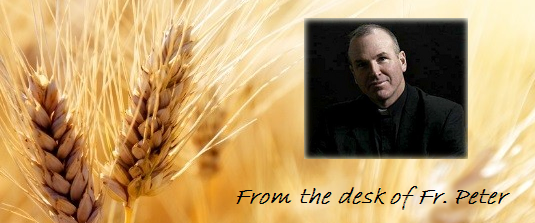Peace and blessings to you!
The readings this weekend do not bring a lot of comfort with them. Rather, they remind us that lives of faith and service will encounter struggle but God is always present to help!
Jeremiah lived in a very troubled time. His country of Judah was under the control of the Assyrian Empire and this led the people away from God to following the religion of foreign rulers, which was idolatry. Jeremiah’s message was to define true religion and to proclaim that the coming wars were a result of the people’s wrongdoing. Jeremiah reminded the people that the covenant between Israel and Yahweh was a matter of love—like the love between a man and a woman in marriage. Sadly, the leadership and the people preferred the status quo. They did not want to change and they made Jeremiah suffer for calling them to turn their hearts and come back to God.
In the Gospel, Jesus tells his disciples that he did not come to bring peace to the earth but rather division. “I have come to set the earth on fire, and how I wish it were already blazing!” Many of us experience conflict when we hear these words and we are concerned when it seems that God’s word is giving people a warrant to shatter peace, to cause division, and be prophetic to the point of disrupting the civil status quo.
Over the past year we have seen several terrible tragedies: shootings at schools, shooting of police and police killing people. It doesn’t end there: In Europe, the Middle East and Africa the violence has caused hundreds of thousands of deaths and millions of refugees. In the US we continue to have polarizing discussions around the Second Amendment, Religious Liberty, Freedom of Conscience, transgenderism and same sex “marriage”, as well as the continuing menaces of human trafficking, pornography and violence in American cinema and video games. The proponents of abortion are promoting violence.
The Gospel values that we as Christians profess are in direct conflict with all the above public topics. But it is first of all felt inside of ourselves. The call to Christ is first of all personal and it moves us to public witness. The Letter to the Hebrews calls us to “rid ourselves of every burden and sin that clings to us.” The violence that we first feel is when we turn from darkness to light. It is the violence of conforming our will and desires according to Christ’s law of love and service to God and neighbor rather than selfishness. Some of us may feel alone and neglected in our own household rather than loved and cared for. Perhaps the violence required is speaking out and expressing our feelings in a non-threatening way so that new life may begin through new patterns of behavior that speak in love languages. Another dimension of violence is zeal for justice over complacency, desire for holiness over indifference, prophetic speech over the status quo. The hearer of God’s Word cannot remain idle or un-moved for God’s Word is truly alive and when it strikes the heart, it can move mountains. St. Catherine of Sienna said “if you are what you should be, you will set the whole world on fire.” For our part, we must believe and put our faith into practice in a most congenial way, first in our own hearts and homes, then publicly in our community. God bless you always! +++ Fr. Peter

